The Faces and the Fire Behind the Movement for Antiracism Discipleship
By Bener Agtarap

Why Antiracism Discipleship?
Racism distorts the image of God in every person and fractures the beloved community Christ calls us to build. Antiracism discipleship is not a side project—it is central to following Jesus. Grounded in scripture and Wesley’s call to “do no harm, do good,” this work calls individuals and congregations to repent of personal and systemic complicity in racism and to embody love, justice, and reconciliation in tangible ways. It is a lifelong journey of becoming more like Christ by confronting sin, embracing transformation, and pursuing justice for all.
What Is the Antiracism Discipleship Connective (Task Force)?
The Antiracism Discipleship Connective (Task Force) is a collaborative initiative of Discipleship Ministries of The United Methodist Church formed to equip congregations and leaders to confront racism as part of a core expression of Christian discipleship. Rooted in the Wesleyan tradition of personal and social holiness, the task force brings together diverse voices committed to developing theological, practical, and actionable tools for transforming hearts, churches, and communities.
To learn more about antiracism discipleship and the work of the connective, consider the following:
- Click here to get a copy of the booklet titled Antiracism Discipleship: An Intentional Discipleship Pathway in the Face of Systemic Racism.
- Join a monthly Connective Learning Session series to learn more and act boldly in doing antiracism work as disciples of Jesus. To get details and sign up to join, contact Amania Drane by email at [email protected].
- Visit the United Methodist General Commission on Religion and Race (GCORR) at gcorr.org and r2hub.org for additional suggested resources.
Who Are the Members of the Connective (Task Force)?
The connective is composed of a dynamic and diverse group of lay and clergy leaders, scholars, and justice advocates from across the United Methodist connection. Members include experienced church leaders, pastors, community organizers, legal professionals, educators, and emerging young voices from varied cultural, racial, and theological backgrounds. Each member brings deep commitment and unique insight to the shared mission of equipping the church for transformative antiracist discipleship. Together, they embody the inclusive, justice-seeking community they envision for the Church.
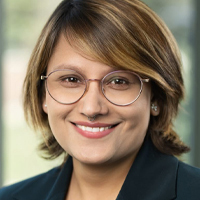
Aabiskar Sharma is from Nepal. She studied psychology in counseling, religious studies, and nonprofit management at Morningside University. She will attend Garrett-Evangelical Theological Seminary in Chicago to study clinical pastoral counseling. Aabiskar believes that the work of antiracism discipleship is important for Christians who reflect Jesus’ call for love, justice, and reconciliation. As Christ’s disciples, we must treat all people with dignity and respect.
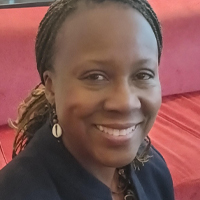
Amania Drane is a program manager in the Northern Illinois Conference of the United Methodist Church. She has a B.A. in African studies and an M.S. in management and organizational behavior. She works with clergy and laity on antiracism, discipleship, the status and role of women, and young people’s ministry strategy and goals. She has a deep love for the church and for living a purposeful life.
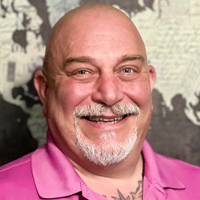
Chuck Farone is a dedicated servant-leader from Northeast Ohio with a deep heart for ministry and mission. A retired U.S. Army veteran, his service took him to more than twenty-three countries—many in the developing world—where he discovered his calling to serve, educate, and uplift the marginalized.
After his military career, Chuck became an emergency room and trauma nurse. Guided by his spiritual gifts of leadership and teaching, he entered lay ministry and is a Certified Lay Speaker, preaching in local churches and teaching Lay Servant Courses across his district. He is currently studying to become a Certified Lay Minister with a focus on church planting.
Chuck has served as a lay leader, confirmation teacher, and a youth and children’s ministry director. He also leads the “Buckeye Boys,” a Fresh Expression men’s ministry that meets in a coffee shop for fellowship, community engagement, and spiritual growth.
He is joyfully partnered in life and ministry with his wife, a United Methodist pastor. They have four children, four grandchildren, and two German shepherds.
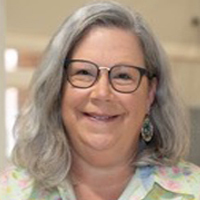
Claire Cox-Woodlief is a layperson from the North Carolina Conference of the United Methodist Church, where she has served as a delegate to Jurisdictional and General Conferences. She has served as chair of the NCCUMC Board of Church and Society and is the co-founder of the North Carolina Institute of Spiritual Direction and Formation. As she lives out her call to be a disrupter of unjust systems, she has led antiracism efforts in local churches, districts, and the North Carolina Conference. She serves on the Antiracism Discipleship Task Force. She is a qualified administrator of the Intercultural Development Inventory (IDI), a certified facilitator of Sacred Conversations to End Racism (SC2ER), a spiritual director, and the founder of CCW Transformation Ministries, LLC. She also serves as the executive director of White Memorial Presbyterian Church in Raleigh, North Carolina.
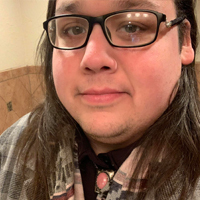
Cody C. Robinson, M.S., OSP, is a prolific scholar, public theologian, and United Methodist pastor.
ᏌᎳᎻ ᏛᏃᏪᎳᏂ (Cody C. Robinson), a citizen of the United Keetoowah Band of Cherokee Indians in Oklahoma, grew up in the small Cherokee community of Shady Grove—nestled between the twin tribal capitals of the Cherokee Nation and the United Keetoowah Band in Tahlequah, Oklahoma.
With more than sixteen years’ experience in the academy, Cody has a Master of Science in higher education (with distinction in graduate research) and a Master of Divinity from Phillips Theological Seminary. His research focuses on Christian education, Indigenous hermeneutics, and postcolonial theologies. His pedagogical and scholarly inspirations include Frantz Fanon, bell hooks, Paulo Freire, and Søren Kierkegaard.
In vocational ministry, Cody serves as senior pastor at D.D. Etchieson Memorial Indian United Methodist Church.
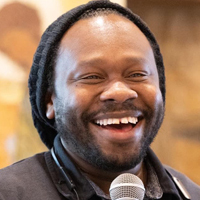
Derrick Scott III is passionate about the church and raising a new generation of leaders and laborers who will live as disciples of Jesus Christ to transform the world. With more than twenty years’ experience serving college-aged young adults in Northeast Florida, he currently serves as executive director and digital campus minister for Campus to City Wesley Foundation and Studio Wesley. He also serves as co-lay leader for the Florida Conference of the United Methodist Church and associate director of learning and innovation for the Texas Methodist Foundation. He has an undergraduate degree in history, is a Cicerone Certified Beer Server, and a textbook introvert. He loves eating sushi, flying on Delta, talking about the Enneagram, and taking care of his Chihuahua-mix dog, Winston, and Bengal cat, Julian. Most important, he hates mayonnaise. #blm #FaithfullyLGBTQ
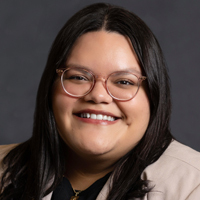
Estefany Sanabria is a fellow and staff attorney with the National Immigrant Justice Center’s In-House Asylum team in Chicago, Illinois. She graduated from DePaul University College of Law, and she received a certificate in public interest law in 2024. During law school, Estefany participated in DePaul University’s Asylum and Immigration Legal Clinic. She is a lay member at Humboldt Park United Methodist Church in Chicago, Illinois. Estefany is passionate about social justice and the law.
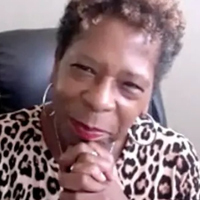
Micheal Pope is a leader within the United Methodist Church and her community. She holds the title of president of the Association of Annual Conference Lay Leaders and Conference Lay Leaders of the California-Nevada Conference, and she serves as a board member of the General Commission on Religion and Race. Micheal has been an advocate for more than twenty-seven years and is a recognized social justice voice in California. Micheal believes that the “kin-dom” of God is inclusive and honors the beauty of humankind.
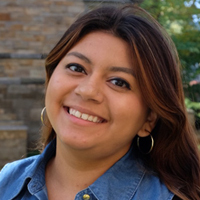
Odyssey Heredia is a dedicated and passionate emerging leader in The United Methodist Church, currently pursuing a Master of Divinity at Yale Divinity School in New Haven, Connecticut. A native of the vibrant border region of El Paso, Texas, Mexico, and New Mexico, Odyssey’s multicultural upbringing has deeply shaped her commitment to justice and ministry.
Before her time at Yale, Odyssey earned her Bachelor of Arts in philosophy and religion with a minor in music from Southwestern College in Winfield, Kansas. Throughout her academic and spiritual journey, she has actively served in various ministries within the United Methodist Church and is now on the path toward ordination as a deacon.
Odyssey is especially passionate about economic justice, women’s rights, and immigration reform, issues that reflect her deep concern for equity and human dignity. She brings a creative spirit to her advocacy, often composing music that weaves together themes of faith and justice, using art as a tool for transformation and hope.
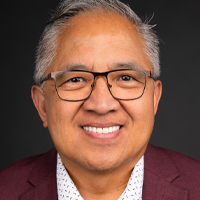
Rev. Bener Baysa Agtarap is an ordained clergy member of the California-Nevada Annual Conference of the United Methodist Church. He serves as the Executive Director of Path 1: Community Engagement and Church Planting and the Director of Connectional Mobilization at Discipleship Ministries. In these roles, he provides visionary leadership for the church’s efforts to establish new faith communities and revitalize existing ones. He also leads the Antiracism Discipleship Initiative at Discipleship Ministries, equipping congregations and individuals to confront racism and live out Christ’s call to justice and inclusion. He is an accomplished coach, author, and a passionate billiards enthusiast. He resides in West Sacramento, California, with his wife, Clarita.
A Call to Action:
As United Methodists, we are called to embody Christ’s love in ways that transform lives and communities. The work of antiracism discipleship is not optional—it is essential to living out our faith with integrity and purpose. In a world fractured by injustice, we must be a church that reflects the inclusive heart of God. Let us rise to this challenge—empowered by the Holy Spirit—to love boldly, serve joyfully, and lead courageously. By committing to the journey of antiracism discipleship, we fulfill our mission to make disciples of Jesus Christ for the transformation of the world, building a future where every person is seen, valued, and treated as beloved. Now is the time to act—within our churches, our communities, and ourselves.
Let the transformation begin with us.
Questions? Contact Bener Baysa Agtarap, Executive Director of Community Engagement and Church Planting/Path1 and Director of Connectional Mobilization, World Service at Discipleship Ministries of The United Methodist Church, at [email protected].
Contact Us for Help
Contact Discipleship Ministries staff for additional guidance.
